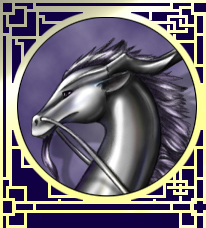|
Halfling (n): A creature
parented by two creatures of different kind, one magical and one
natural, usually a human mother and
a fae father.
Natural creatures such as the humanoid races
cannot interbreed (with one odd exception that will be touched on
later); no more than a dog can successfully breed with a cat. However,
when a magical creature breeds with a natural one, there is an
amazingly high success rate. Elves and dragons refer to creatures of
such parentage as "halflings" while humans and dwarves reserve the term
for half-fae/half-humans, or half-fae/half-dwarves. Fairies (small
humanoid fae that may change size or appearance at will) are arguably
the most promiscuous creatures in the world, and when they are not
tricking the non-magical humans and dwarves, they are trying to mate
with them. Elves are generally left alone by fairies for, having some
magical nature themselves, they are not often fooled by the fairies'
antics. On that note, the hairy dwarf females seem to prefer hairy
dwarf males...and fairies seem to dislike being hairy so dwarves
do not often fall victim either. The results of such breedings meet
with success only so far as
there is actually a child. The halfling is, with some variation, a very
short (sometimes as little as 2 feet tall) human, sometimes with fairy
wings, sometimes not. The wings, if there, may or may not work. If the
halfling is not half-fairy, he will likely have some other physical
features that tie him to his fae parentage. The halfling always has
some form of magic powers, sometimes dormant and sometimes not, usually
beyond the halfling's control. Halflings also generally have
notoriously short attantion spans, making it difficult for them to
learn to control their powers, magical or otherwise. However, they
sometimes have millennia at their disposal so, provided they survive,
they may yet learn.
Ogre (n.): A creature parented by a
human or
dwarf and a goblin or troll...or likely, by two other ogres.
Halflings can interbreed (sometimes producing
quarterlings, which are just like halflings for all intents and
purposes) and if there are enough of a variety of halfling
interbreeding a demi-fae race is born. Ogres as a demi-drae race are
half-human, half-goblin. Ogres generally look like large humans with
overlarge forearms and hands, grey-greenish skin, and ugly features.
They're not reknowned for their intelligence, but in truth, most might
aspire to at least average human intellect but don't bother. Ogre
villages
have formed here and there
around Oris, but ogres as a whole have not developed past a primitive
society and will likely never form themselves into anything more. This
is in because of their inhereted goblin tendencies towards pillaging,
raping, cannibalism, and random raging and the consequent hunting
from the
established races.
However, the existence of ogres suggests that
other semi-human demi-fae races such as merpeople, centaurs, and fauns
may have similar origins. Demi-fae creatures such as griffons, sphinxes
and pegasi are also thought to have similar origins.
Half-elf (n.): A creature having a
human mother and an elf father.
Natural creatures can only successfully interbreed
with their own kind. However, when an elf male beds a human female, he,
for some reason, stands a decent chance of getting her pregnant.
However, there is no report of a human male successfully impregnating
an elf female. Magecrafters generally attribute this to elfin magic,
saying that it, like fae magic, gives the elf male an improved potency
in such encounters. They do not take into account the frequency of such
encounters. A human female, raised in a patriarchal society where she
can expect little respect or acknowledgment from a man, finds the elf
male not only quite handsome, but also doting, genteel, and sensitive,
while the elf male, raised in a matriarchal society where he is
expected to devote himself to courting a single female for years on
end, finds the human female attractively easy. On the other hand, while
a human male may be attracted to an elf female's beauty and "spunk,"
she will likely be repulsed by his perceived coarseness, forwardness,
and disrespect...even if he thinks he's being nice.
The "half-elf"- as he will be called by humans -
other races still call them halflings - will exhibit physical traits of
both his parents, but mostly look like a very tall human with pointy
ears. The half-elf is a natural hybrid, and as such has a hybrid's
vigor and stamina. Half-elves have very healthy appetites and
often grow much taller than either parent. He is usually physically
clumsy, what with lengthy limbs that were always growing too fast for
him to get used to as he matured. He will, however, possess immense
physical strength and stamina; many half-elves can do twice the labor
of an averge human or elf with the same amount of exursion. (Given
this, many farmers will encourage an elfin traveler to take his wife to
bed while he's in the area; half-elves make very popular farm hands.)
The males are always sterile, and the females are sterile 99.5% of the
time. Even so, a half-elf's sexual appetite often matches the one he
has for food. Generally half-elves have better hearing than a human,
but their eyes tend to be human-like instead of elf-like. Half-elves
almost never inherit elfin magic, but are
usually quite talented at magecraft. Half-elves are usually long-lived
compared to their human parents, but have something of the short-stick
in regards to life expectency. Because of the unprecedented way the
genes may mix, they may expect to live somewhere between 50 - 500 years.
While attached to the place of their upbringing,
half-elves usually take to wandering before very long, as it is hard to
get attached to the people that are so different from them. Because of
their immense strength and magical talents, they make very good heroes
and champions, so when they learn martial skills, they often go on to
be great protectors of their hometowns or homeland.
Back to Races
|
|












